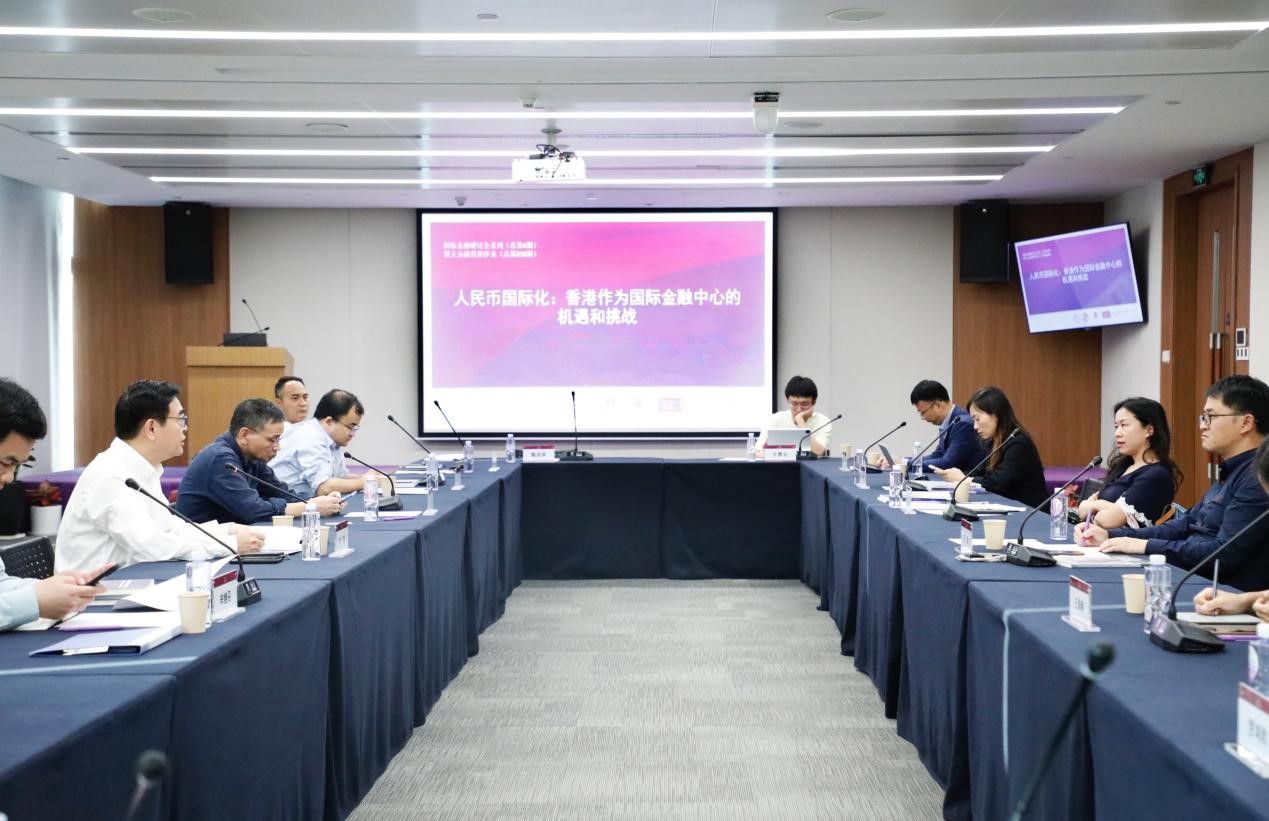Macro-Finance Salon (No. 218): RMB Internationalization: Opportunities and Challenges for Hong Kong as an International Financial Center
2024-01-12 IMIOn November 1, the Macro-Finance Salon (No. 218) and the International Finance Seminar (No. 4) of the Policy and Practice Institute (PPI) of The Chinese University of Hong Kong, Shenzhen, was held in Shenzhen. This event was co-organized by IMI and PPI, supported by Hong Kong Institute for International Finance. Focusing on the current status, issues, and trends of RMB internationalization, the meeting delved into the opportunities and challenges for Hong Kong as an international financial center.
Chaired by Professor Xiao Geng, Director of the Policy and Practice Institute and President of the Hong Kong Institute for International Finance, the seminar featured prominent figures such as Professor He Qing, Associate Dean of the National Finance Academy and Professor at the School of Finance of Renmin University of China; Mr. Ye Xiang, Director and General Manager of Hui Xin Capital, and Director of the Hong Kong International Finance Society; Mr. Xin Jizhao, Head of South Finance Group, Shenzhen; Ms. Lin Li, Deputy Branch Manager of Nanyang Commercial Bank (China) Limited, Shenzhen Branch; Professor Lu Dong, Assistant Professors Wang Chenxi, Chen Zhaojing, and Wang Jingye from the School of Finance at Renmin University of China; Ms. An Ran, Executive Secretary-General of IMI, and Ms. Cui Tiantian, Director of the Domestic Cooperation Department of IMI; Mr. Ben Li, Policy Researcher at the Policy and Practice Institute; Mr. Lai Chengzhi, former Branch Manager of Nanyang Commercial Bank (China) Limited, Shenzhen Qianhai Branch; and Ms. Luo Hongjun, Researcher at the Hong Kong-Guangdong Economic and Trade Development Promotion Association.

During the keynote speech session, Mr. Xin Jizhao introduced the recent research conducted by South Finance Group in the fields of media and think tanks. He asserted that future competition between China and the United States would focus more on non-financial areas such as industrial chains and high-tech. Therefore, the value of RMB internationalization should be viewed from the perspective of reducing cross-border investment risks and supporting the development of real industries. In the past, RMB internationalization was based on China's foreign trade, which involved one-time settlements, leading to limitations in its internationalization level. With some of China's industrial and supply chains shifting to Southeast Asia, Chinese enterprises are expanding globally. In the future, RMB internationalization should be a result of China's economic and financial internationalization. It is essential to consider how to use RMB internationalization to serve the 'going global' strategy and promote outbound investments by enterprises.
Mr. Ye Xiang cited a wealth of data, indicating that the process of RMB internationalization is highly correlated with the country's industrial and trade development. Relying solely on financial products without substantial support from the real economy makes RMB internationalization challenging. Although China has a significant trade surplus, enterprises venturing abroad lack sufficient support, attributed to geopolitical and institutional policy reasons. To achieve RMB internationalization, a series of complementary measures are needed to provide convenient services and security guarantees for enterprises going global, reducing the fixed costs of overseas operations, and further promoting the global layout of industrial and trade chains.
Professor Xiao Geng emphasized that Hong Kong would play a crucial role in the process of RMB internationalization. Currently serving as a gateway for overseas capital inflow and domestic enterprises going global, Hong Kong should fully leverage its business environment connected to the international arena, providing excellent services for cross-border enterprises and capital. Institutional innovation can also be explored by conducting Hong Kong's offshore business in mainland China, further expanding the scale of offshore assets and services in Hong Kong.
In the discussion session, Professor He Qing, President Lin Li, Professor Lu Dong, and Professor Chen Zhaojing raised questions on macro policies, investor and consumer confidence, cases of enterprises going global, and cross-border cooperation between Shenzhen and Hong Kong. The experts and scholars further delved into these topics in-depth.
Translated by Han Chun
